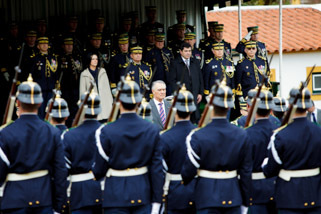
Majesty,
Heads of State,
Prime Ministers,
Ministers,
Iberian American Secretary General,
Dear Friends,
My first words are to associate myself to the tribute that is being paid to the great politician that was Dr. Nestor Kirchner.
This Summit is being held during a special year for the History of our countries, a year in which a large majority of the States represented here, starting with Argentina who is welcoming us so fraternally, will commemorate the Bicentenary of their independence.
As I had the opportunity to state, yesterday, at the inaugural act, that after 200 years have gone past there could not have been a better way for us to commemorate these historic dates than, gathered together here, as free and sovereign States, by reasserting our common will to take advantage of the much that links us, to build a better future for our peoples.
Nations that do not watch over their History, through the knowledge and value of their past, take the risk of not having a future. But it is also true that a nation that does not invest in its future will have little use for its History.
I wish, for this reason, to once again warmly congratulate President Cristina Fernández de Kirchner, for the choice of this theme for the Summit. Nothing could be more appropriate to mark the Commemorations of the Bicentenaries than projecting the role of education in the building of the future of each of our nations.
For some reason education was the first expression of social responsibility of the modern State, in addition to the traditional functions of sovereignty.
National educational systems have been decisive tools in the promotion of civic inclusion, contributing towards the training of citizens conscious of their rights and duties, conscious of the importance of their participation in the future of the society in which they are inserted.
We know we do not have perfect societies, nor have we perfect schools.
Although in differing degrees, our societies continue facing issues deriving from inequalities in the distribution of income, from multiple situations of social exclusion, from the difficulty in creating sufficient wealth to guarantee employment and protection in childhood, for the aged, and for situations of physical and mental handicaps, in sickness and in unemployment.
Such circumstances provide a still greater value and urgency for the education of the younger generations, for their training and qualification. We have to prepare them to face the challenges of these new eras of acceleration of History and the global intensifying of the mechanics of competition.
We need citizens who are culturally richer and more open to the world and to diversity, more innovatory and enterprising, freer, more autonomous, more responsible politically and showing greater social solidarity. Cooperation amongst our countries has a fundamental role here, through the promotion of interchange between our students and educational establishments.
A school is, due to its nature, an inclusive institution. A school allows the qualification of the younger generations and, as such, to shorten the distance between those who can benefit from the access to the opportunities of welfare and personal achievement and those that have difficulties in freeing themselves from situations of poverty and social exclusion.
A successful school is a decisive step towards a more cohesive, fairer, freer and more developed society.
We may have generations with greater capabilities but, if we should not provide them with more and better opportunities the investment made will be of little worth. For this reason it is fundamental that conditions are created so that institutions, enterprises, local communities and civic organizations become a sourcxe of opportunities.
An economy or a society that does not generate opportunities for the younger generations risks losing a significant portion of its investment and of its human assets to those countries who knew how to safeguard and promote them.
In economies that are more than ever global, the growing mobility of the labour factor is a threat for the countries that are needful of human assets.
The challenge is thus the promotion of an education that develops greater capabilities, in a free and dynamic society, capable to ensure more and better opportunities. This is the sole combination capable to guarantee the inclusion that is essential for each of our citizens to become party to a collective project of hope and trust in the building of a better future.
Madam President,
Dear Friends,
Finally, I wish to address our friend, President Lula da Silva. To let you know, President, that these Summits will greatly miss the strength of your convictions, the intelligence which you devoted to them, your so genuine and generous humanity. You are one of the figures that has most intensely marked – and will continue to mark – our times. I will not tell you good bye. One doesn’t say good bye to friends. I just want to take advantage of a very special moment to wish you the best of luck, happiness and well being. And to thank you my friend, thank you President.
Thank you very much.
© 2006-2016 Presidency of the Portuguese Republic
You have gained access to the records of the Official Site of the Presidency of the Republic from 9 March 2006 to 9 March 2016.
The contents available here were entered in the site during the 10 year period covering the two mandates of President of the Republic Aníbal Cavaco Silva.